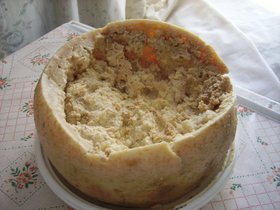Casu marzu
| ||||
|---|---|---|---|---|

| ||||
| Country of origin | Italy | |||
| Region, town | Sardinia | |||
| Source of milk | Sheep | |||
| Pasteurised | No | |||
| Texture | Soft | |||
| Aging time | 3 Months | |||
| Certification | none | |||
Casu marzu (also called casu modde, casu cundhídu, or in Italian formaggio marcio) is a cheese found in Sardinia, Italy, notable for being riddled with live insect larvae. Casu marzu means "rotten cheese" in Sardinian and is known colloquially as maggot cheese.
Derived from Pecorino Sardo, casu marzu goes beyond typical fermentation to a stage most would consider decomposition, brought about by the digestive action of the larvae of the cheese fly Piophila casei. These larvae are deliberately introduced to the cheese, promoting an advanced level of fermentation and breaking down of the cheese's fats. The texture of the cheese becomes very soft, with some liquid (called lagrima, from the Sardinian for "tears") seeping out. The larvae themselves appear as translucent white worms, about 8 mm (1/3 inch) long. When disturbed, the larvae can jump for distances up to 15 cm (6 inches), prompting recommendations of eye protection for those eating the cheese. Some people clear the larvae from the cheese before consuming; others do not.
Appearance and taste
Yaroslav Trofimov, in the August 23, 2000 edition of The Wall Street Journal, describes the cheese as "a viscous, pungent goo that burns the tongue and can affect other parts of the body". Susan Herrmann Loomis reports an encounter (in a 2002 Bon Appétit article):
He … grabbed a piece of pane carasau, the traditional flatbread of Sardinia, rinsed it quickly under water to soften it and went to a large glass jar on a side table. He opened the jar, scooped out a mound of what looked like thick cream, and folded the bread around it. …When he was finished I asked what he had eaten, and he got up to show me. Inside the jar was pecorino, busy with small, white worms. I'd heard about this cheese, but this was the first time I'd gotten so close. … A friend of his … said, 'It's formaggio marcio [literally, "rotten cheese"], cheese with worms. It's a delicacy. It's the most beautiful gift you can give a Sardinian shepherd.'
The cheese is typically consumed with Sardinian bread (pane carasau) and Cannonau, a strong red wine.
Dangers
Several food safety issues have been raised with casu marzu:
- Anecdotal reports of allergic reactions.
- A risk of the decomposition advancing to a toxic state. (Folk wisdom in Sardinia holds that the presence of still-living larvae are an assurance that this has not yet happened.)
- Risk of enteric myiasis: intestinal larval infection. Piophila casei larvae can pass through the stomach alive (human stomach acids do not usually kill them) and take up residency for some period of time in the intestines, where they can cause serious lesions as they attempt to bore through the intestinal walls. Symptoms include nausea, vomiting, abdominal pain, and bloody diarrhea.
Because of these health threats, or simply because it is considered a contaminated product, casu marzu cannot be legally sold in Italy. Within Sardinia, enforcement of the ban is sporadic and the cheese is available as a black market item, selling for about three times pecorino's price.
Other regional names
Besides the common Casu marzu name, there are several other regional names:
- Marcetto or cace fraceche - Abruzzo - (L'Aquila)
- Salterello - Friuli - (Udine)
- Ribiòla cui bèg - Lombardia - (Piacenza)
- Furmai nis - Emilia Romagna
In Piemonte, specifically the alpine mountains (Maritime Alps) on the border with France, the fermentation procedure is not always the analogous to that of the casu marzu. For example, the cheese is left to the open air until Piophila casei larvae are naturally laid in the cheese. Then it's aged in white wine, grapes, and honey, preventing the larvae from emerging, giving the cheese a strong flavor.
See also
- Milbenkäse, a cheese specialty from Würchwitz, Germany, which is fermented by living cheese mites
- Mimolette, another cheese aged by the action of cheese mites, from Lille, France
References
- Excerpts from Yaroslav Trofimov's Wall Street Journal article on casu marzu
- Loomis, Susan Herrmann (2002). Sardinia, Italy Epicurious.com adaptation of a Bon Appetit article. Retrieved July 31, 2006.
- Lieutenant Brian F. Prendergast, USN (2001). Filth Flies: Significance, Surveillance and Control in Contingency Operations (.pdf format). Retrieved October 1, 2005.
| Asiago · Basket · Bel Paese · Bocconcini · Bra · Brös · Burrata · Caciocavallo · Caciotta · Caprino · Casciotta d'Urbino · Castelrosso · Casu marzu · Crescenza · Crucolo · Dolcelatte · Fontina · Gorgonzola · Grana (Padano) · Liptauer · Mascarpone · Monte Veronese · Morlacco · Mozzarella (di Bufala Campana) · Parmigiano-Reggiano · Pasta filata · Pecorino (Romano, Sardo, Siciliano) · Piave · Provolone · Ricotta · Robiola · Romano · Scamorza · Sottocenere al tartufo · Stracchino · Stracciatella di Bufala · Taleggio · Toma |